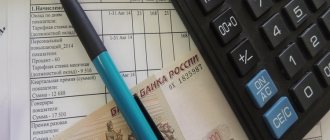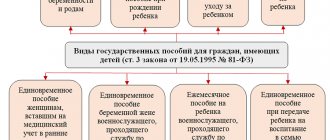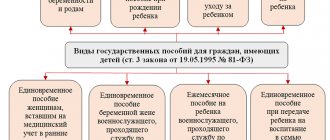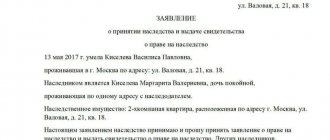Receiving government assistance to pay for housing and communal services
Subsidization is compensation paid from budget funds to people classified as low-income. Before finding out exactly how benefits are issued, you should consider a number of mandatory conditions for receiving them. These include:
- no debt on utility bills;
- the level of income per citizen should not exceed the subsistence minimum.
Let's look at an example. The average monthly income in a family of two people is 21 thousand rubles. 4 thousand 850 rubles are spent on paying for housing and communal services, which is 23% of the total amount. In all respects, this family has the right to apply for government assistance.
If the accrual of payments is approved, the money will be transferred to the applicant using the details specified in the application. Compensation funds are accrued monthly until bills for housing and communal services are generated. Financial assistance is provided only for six months. After this period, a package of papers is again formed and submitted for consideration.
We’ll talk further about what documents are needed to apply for and receive a subsidy for utility bills.
Child benefits for large low-income families
There is no definition of a large family in federal legislation. In most regions, a family with three or more children is considered large.
Allowances, benefits and other payments for children to low-income large families, as a rule, are established by regional legislation and vary depending on the demographic and social policy of a particular region.
One-time payments of benefits and benefits are provided both upon the birth of a third child, without taking into account whether such a family is low-income, and under the additional condition that the family income is less than the subsistence level.
Among the federal benefits for large families, the possibility of obtaining a tax deduction for property tax stands out (clause 6.1 of Article 403 of the Tax Code of the Russian Federation). This deduction allows you to exempt 5 meters of apartment area (7 meters of residential building area) from tax for each minor child. In this case, the applicant can submit an application for the deduction himself, or the tax rate will be reduced based on the data available to the tax office.
Regional types of assistance to large families
The most significant type of support for large families in a number of regions is regional maternity capital, which is due at the birth of a third child. The size, conditions and procedure for obtaining regional maternity capital are determined by regional authorities. Detailed information can be obtained from the social security authorities at your place of residence.
The second type of support for large families is gubernatorial benefits. They can be either one-time (at the birth of the third child) or regular (until the child reaches 18 years of age). In addition to benefits, large families can apply for other types of regional assistance (benefits):
- free provision of land for housing construction or farming (for example, in the Voronezh region);
- compensation for children for travel on public transport (for example, in Moscow);
- compensation for schoolchildren to purchase school uniforms (in Moscow);
- providing vouchers to children's health camps free of charge or with discounts (for example, in the Murmansk region);
- provision of places in kindergartens out of turn (in the Republic of Tatarstan);
- allocation of budget funds for partial or full repayment of a mortgage loan (in the Udmurt Republic).
Find out what benefits are paid until the child turns 18 years old in ConsultantPlus. If you do not have access to the K+ system, get a trial online access for free.
Who is entitled to preferential payments?
State subsidies for housing and communal services are federal benefits. They are available to citizens of all regions of the Russian Federation who have grounds for receiving them.
The following may count on subsidies:
- tenants of public housing;
- persons renting housing from private landlords;
- participants in housing associations (cooperatives);
- owners.
People with different marital statuses can apply for financial assistance. Among those particularly vulnerable in terms of income are:
- pensioners;
- single mothers;
- unemployed people officially registered with the Employment Center;
- the poor;
- large couples;
- disabled people.
When finding out what documents are needed for compensation, what is needed to receive a housing subsidy in the department of the same name (OZHS), you should know that foreigners can also count on benefits. A prerequisite for them is the existence of an international agreement with the Russian Federation. For example, visitors from Kyrgyzstan or Belarus are entitled to government assistance, since Russia has concluded a corresponding agreement with these states.
A foreign applicant must meet certain requirements:
- have official registration in the house or apartment;
- spend an amount exceeding the established subsistence level on payment for housing and communal services;
- not be a debtor.
An important condition when assessing the possibility of receiving compensation payments is the footage. For one person there is a maximum of 33 residential square meters, for two - 42 m², and for three or more - 18 m² each.
If the area exceeds the specified parameters, subsidies will be denied. Also, state financial assistance is not available to persons who do not have permanent registration at their place of residence (where registration is planned) and to renters without registration.
Confirm the special status of the beneficiary
The mere provision of a pension, alas, is not enough to receive benefits on rent.
Laws identify special categories of beneficiaries who are entitled to full or partial exemption from payments for housing and communal services. At the federal level, benefits are guaranteed:
- Heroes of Russia, the USSR, Heroes of Socialist Labor and Heroes of Labor of the Russian Federation, full holders of the Order of Labor Glory, as well as members of their families (they are completely exempt from paying for the maintenance of housing and utilities),
- participants of the Second World War, combat veterans, "Chernobyl" and disabled people (they pay only 50% for housing and communal services, the rest is compensated by the state).
At the regional level, benefits can be provided to:
- labor veterans (for example, in the Nizhny Novgorod region, EDC is paid if the income level does not exceed 22,266.40 rubles per month),
- rehabilitated citizens and members of their family,— Honorary donors,
- home front workers (for example, in Moscow, those who served in the city from July 22, 1941 to January 25, 1942 are exempt from rent by 50%), etc.
You should contact your local social security office for benefits.
Please note that the courts have become more sympathetic to the issue of permanent registration to receive benefits. Thus, recently the Supreme Court of the Russian Federation recognized the right to benefits for a labor veteran, despite the fact that only his temporary residence in the region was confirmed, without permanent registration (RF Supreme Court, case No. 18-KG19-31).
Income level to qualify for compensation
The ability to receive benefits from the state largely depends on regional policy. The right to claim preferential accruals is determined not by the specific amount of family income, but by what share it spends on housing and communal services payments.
In Moscow, for example, it will be possible to obtain a subsidy if utility costs amount to more than 10% of total income. In St. Petersburg, you can enlist government help only when the cost of housing and communal services exceeds 14%. In Voronezh, subsidies are provided for payment for utility services in the amount of 10-18% of total income:
- 15 percent for large families, single pensioners, single mothers and people living in low-rise residential buildings, in which heating is provided by companies at inflated rates;
- 10% is relevant for those whose income does not reach the subsistence level.
To make the calculation, you need to add up the earnings/pension received (other documented accruals) for the last six months and compare the total amount with the amount of mandatory expenses for utility bills. If the result is more than 22%, citizens have the right to apply for government benefits. It is important to understand that only material wealth that is officially registered is taken into account.
Before preferential payments are accrued, government officials will once again carry out calculations, taking into account the average amount of a citizen’s income over the last 6 months and the percentage required to cover housing and communal services bills. If the amount equals or exceeds the established standards, submitting documents to receive a housing subsidy will become possible.
Shares of allowable expenses for housing and communal services
Housing and communal services compensation payments are calculated using a special formula. It looks like this: (Housing and communal services cost standard × Number of family members) − (Total family income × Share of allowable expenses).
If almost all parts of the formula are clear and have already been calculated more than once, then the “share of allowable expenses” is a less well-known unit of calculation. This concept refers to the ratio of utility costs to basic income. This indicator has a regional basis (each city has its own) and depends little on family income. As an example, the table shows the share of allowable expenses in several cities for 2022.
| Moscow | from 0% to 10% |
| Ekaterinburg | 12% or 22% |
| Saint Petersburg | 14% |
| Novosibirsk | 16% or 22% |
| Nizhny Novgorod | 22% |
You can get legal assistance on housing and communal services issues on our website.
Income taken into account when calculating
When forming compensation accruals, all types of earnings are considered.
- Salary, bonuses, business and investment profits, etc.
- Money received from the sale or rental of real estate.
- Subsidies for foster or ward minors.
- Child benefits received once a month.
- Other types of payments that compensate for utility bills. Subsidy money for covering housing and communal services is not included in the total amount. Conditional discounts for paying for living space and utilities are also taken into account.
When carrying out settlement activities, the income of both the applicant and his relatives is recorded: husband or wife, father, mother, adoptive parents.
Results
Federal and regional legislation provides for a number of benefits, benefits and other types of assistance to low-income families. However, there is no single federal mechanism for providing it, as a result of which residents of some regions receive more assistance than residents of others.
Sources:
- Tax Code of the Russian Federation dated 05.08.2000 No. 117-FZ
- Federal Law “On State Social Assistance” dated July 17, 1999 No. 178-FZ
- Federal Law “On the procedure for recording income and calculating the average per capita income of a family and the income of a citizen living alone for recognizing them as low-income and providing them with state social assistance” dated April 5, 2003 No. 44-FZ
You can find more complete information on the topic in ConsultantPlus. Free trial access to the system for 2 days.
Information confirming income: documents for obtaining a housing subsidy
Lack of official earnings may prevent you from receiving compensation payments. To overcome this obstacle, you will need to document the cause of the disability.
The supporting documentation usually includes:
- certificates from primary and secondary educational institutions;
- papers about non-receipt of a scholarship at an educational institution;
- medical certificate of registration for pregnancy;
- information about the woman being on maternity leave;
- information about undergoing long-term treatment in a hospital;
- certificate of deprivation of liberty of a citizen;
- papers on conducting search activities if a person is considered missing.
Submitting an application
An application for accrual of benefits is submitted in person to a government agency, through an online service (government services) or by mail. But only the owner or tenant of the property has this opportunity. A citizen who is a family member can carry out registration using a previously drawn up power of attorney. In addition, compensation payments can be issued to a person who serves in the army, is in prison or is undergoing compulsory treatment.
Documents required to receive a subsidy
To receive subsidized funds to pay for housing and communal services, you need to collect a package of papers. Among them:
- passports of all program participants;
- birth certificates of children under 14 years of age;
- documentation confirming the right to use an apartment or house;
- payment checks and receipts according to which payments for housing and communal services were made previously;
- documentary evidence of income or lack thereof from all family members;
- details for transferring funds;
- an application for a subsidy drawn up in accordance with all the rules.
If the application is submitted by an authorized person, a corresponding document (power of attorney) is required.
To confirm your level of income, you will need to collect several certificates, including an extract from your place of work on your income for the last 6 months. If there are other benefits issued by the state, you will need data on their amount.
Before submitting a request for information, find out exactly what documents you need to collect yourself. The center requests some information without the participation of the applicant.
Implementing a certificate
After receiving the subsidy, families must proceed in the following order:
- Open a bank account to transfer money from the certificate;
- Choose a real estate agency;
- Choose suitable housing;
- Complete the purchase and sale of an apartment and register it;
- Contact the state registration service, presenting the agreement, receipt and act;
- Provide an agreement to the bank for debiting funds to the home seller’s account;
- Sign the deed of transfer of the residential premises and take a receipt from the seller that the funds have been received by him.
After receiving the apartment registration certificate, it must be submitted to the housing fund that issued the subsidy. Improving living conditions serves as a fact for removing a family from the register.
Important! Having received a certificate for issuing money, the family must use it within a certain period of time. The implementation period for the subsidy is different in each region.
Why may they refuse, suspend or stop payments?
Refusal to accrue compensation funds may occur if:
- the applicant for benefits did not provide all documents;
- he provided incomplete or unreliable data (hid his real income).
Suspension of subsidies is possible when:
- payment for housing has not been made for more than two months;
- the terms of the agreement concluded with the utility company regarding debt coverage were violated;
- the person for whom the benefits are issued has changed citizenship (moved to another country);
- the level of income or family composition has changed.
The accrual of compensation is suspended for 30 calendar days. During this time, an inspection is carried out. Be sure to find out why the recipient of government assistance did not pay housing and communal services bills on time or did not pay off debts as agreed. If circumstances are deemed extenuating, payments will resume.
A complete cessation of subsidies occurs when:
- the citizen receiving government assistance now has a different citizenship;
- the average level of income per person increased to the subsistence level;
- by providing the package, the applicant intentionally submitted false information for consideration;
- payments for utility services have not been made for a long period.
When your financial situation changes for the better and the right to receive compensation loses its relevance, we recommend that you immediately inform the representatives of the OHS about this. Otherwise, the department will seek the return of government money once the changes are discovered and confirmed.
When can an applicant be deregistered?
In what cases is a family removed from the queue to receive a subsidy:
- She voluntarily refused to participate in the program;
- Lost the grounds for assigning a subsidy;
- Moved to another region (this point does not apply to residents of Sevastopol, St. Petersburg and Moscow);
- Received budget money to buy an apartment or build housing;
- Received land for the construction of housing (with the exception of large families with three children);
- Provided documents that did not correspond to the real property status or concealed papers confirming ownership rights.
Important!
If, while waiting, the applicant purchases (receives) an apartment (house) that is unable to improve living conditions or is unsuitable for living, this fact should not exclude low-income citizens from the queue. Temporary registration in another locality is also not a reason for refusal of subsidies. A citizen has the right to temporarily leave his place of registration in connection with work, treatment, or study in another city. This also includes temporary relocation due to fire, apartment flooding and other emergencies.
How to apply for an apartment subsidy in special situations
The family of the owner or the tenant of the property can begin to apply for preferential accruals when the owner:
- is undergoing military service;
- is in prison;
- declared missing;
- declared dead;
- compulsorily treated in accordance with a court decision.
Their relatives may qualify for payments if they continue to live in this house or apartment. In addition to the general package of papers, in this case the following is attached:
- documentation confirming the position (for example, a court order);
- evidence that members of the family permanently lived with the owner on the premises before changing his location.
If more than just family members live in the apartment
Situations like this are rare, but you should find out all the necessary information about them. When other people are registered in the house with you and your loved ones, additional papers must be attached to the completed package:
- certificates confirming payment for repairs, maintenance of housing and utilities, which are transferred by persons not specified in the application for benefits;
- objective reasons why these citizens live in the house.
Purpose of the housing program
The program is designed to solve the housing problem of citizens of the Russian Federation. The conditions for providing subsidies may differ depending on the region of residence of citizens. For example, in Moscow, funds provided by the state can be spent on:
- purchase of housing;
- purchase of housing during the construction phase;
- making a down payment on a mortgage or repaying the principal debt on a mortgage loan;
- to purchase a separate room in a communal apartment in addition to your own.
It is important to note that in order to receive a subsidy, you must have the status of a family in need of improved housing conditions. This status is assigned by the local administration based on the package of documents provided. Moreover, citizens in need of improved housing conditions do not necessarily have to have the status of a low-income family to receive a housing subsidy.
The subsidy is targeted and provided free of charge from the federal or regional budget on a first-come, first-served basis.
Where to send your request
Preferential programs for paying for housing and communal services are administered by social protection. You can generate and submit a document in person, online on a special service or through the MFC.
By entrusting the solution to the issue to the Multifunctional Center, you will only need to collect documentation for housing benefits. The staff of the institution will receive all other information independently. Here, specialists will readily help you fill out the application and forward it to its destination.
Those who want to apply for a subsidy through State Services will have to register on the portal, create a personal account and confirm the creation of an account. The next step is to fill out an application according to the proposed form, attach documents and activate sending.
Who is eligible to receive housing and communal services subsidies and under what conditions
Compensation is due not only to Russian citizens, but to foreigners permanently residing in the Russian Federation and registered in any Russian housing. Who has the right to apply for a housing subsidy to the State Center for Housing and Housing:
- owners of residential real estate - apartments, houses or any part of the housing;
- tenants of residential space under a lease (rental) agreement in a private housing stock;
- members of housing, housing and construction cooperatives;
- users of residential premises in state/municipal housing funds.
If you contact the State Center for Housing or another agency through a representative, prepare a power of attorney to perform actions on your behalf. Online submission of a request is possible only from the direct applicant; the involvement of representatives is not allowed.











